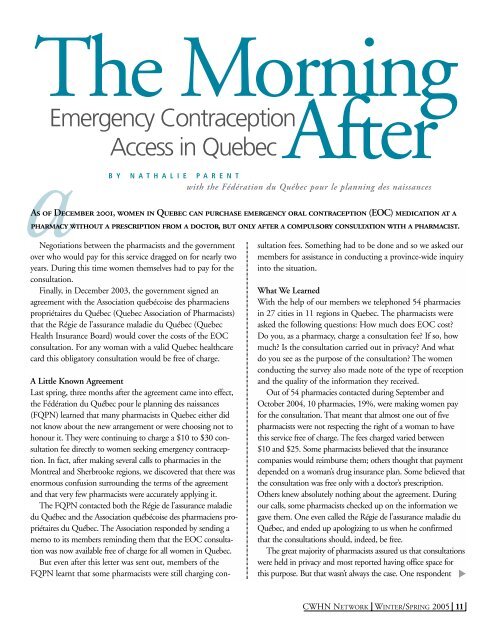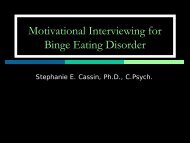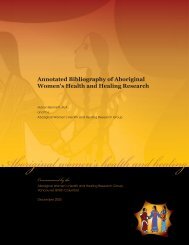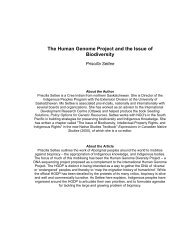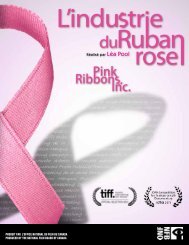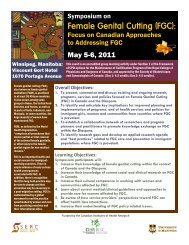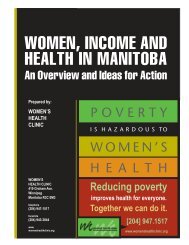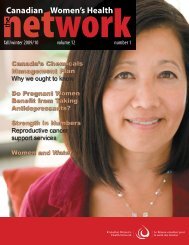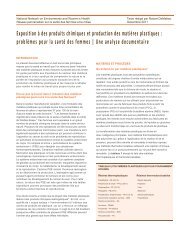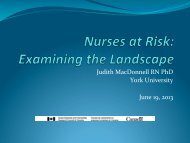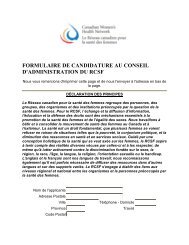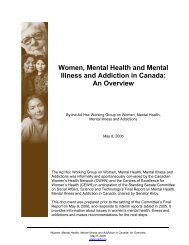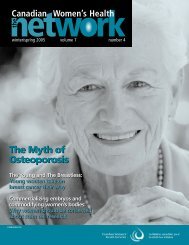NETWORK WIN00 - Canadian Women's Health Network
NETWORK WIN00 - Canadian Women's Health Network
NETWORK WIN00 - Canadian Women's Health Network
You also want an ePaper? Increase the reach of your titles
YUMPU automatically turns print PDFs into web optimized ePapers that Google loves.
The Morning<br />
After<br />
Emergency Contraception<br />
Access in Quebec<br />
B Y N A T H A L I E P A R E N T<br />
with the Fédération du Québec pour le planning des naissances<br />
aAs of December 2001, women in Quebec can purchase emergency oral contraception (EOC) medication at a<br />
pharmacy without a prescription from a doctor, but only after a compulsory consultation with a pharmacist.<br />
Negotiations between the pharmacists and the government<br />
over who would pay for this service dragged on for nearly two<br />
years. During this time women themselves had to pay for the<br />
consultation.<br />
Finally, in December 2003, the government signed an<br />
agreement with the Association québécoise des pharmaciens<br />
propriétaires du Québec (Quebec Association of Pharmacists)<br />
that the Régie de l’assurance maladie du Québec (Quebec<br />
<strong>Health</strong> Insurance Board) would cover the costs of the EOC<br />
consultation. For any woman with a valid Quebec healthcare<br />
card this obligatory consultation would be free of charge.<br />
A Little Known Agreement<br />
Last spring, three months after the agreement came into effect,<br />
the Fédération du Québec pour le planning des naissances<br />
(FQPN) learned that many pharmacists in Quebec either did<br />
not know about the new arrangement or were choosing not to<br />
honour it. They were continuing to charge a $10 to $30 consultation<br />
fee directly to women seeking emergency contraception.<br />
In fact, after making several calls to pharmacies in the<br />
Montreal and Sherbrooke regions, we discovered that there was<br />
enormous confusion surrounding the terms of the agreement<br />
and that very few pharmacists were accurately applying it.<br />
The FQPN contacted both the Régie de l’assurance maladie<br />
du Québec and the Association québécoise des pharmaciens propriétaires<br />
du Québec. The Association responded by sending a<br />
memo to its members reminding them that the EOC consultation<br />
was now available free of charge for all women in Quebec.<br />
But even after this letter was sent out, members of the<br />
FQPN learnt that some pharmacists were still charging consultation<br />
fees. Something had to be done and so we asked our<br />
members for assistance in conducting a province-wide inquiry<br />
into the situation.<br />
What We Learned<br />
With the help of our members we telephoned 54 pharmacies<br />
in 27 cities in 11 regions in Quebec. The pharmacists were<br />
asked the following questions: How much does EOC cost?<br />
Do you, as a pharmacy, charge a consultation fee? If so, how<br />
much? Is the consultation carried out in privacy? And what<br />
do you see as the purpose of the consultation? The women<br />
conducting the survey also made note of the type of reception<br />
and the quality of the information they received.<br />
Out of 54 pharmacies contacted during September and<br />
October 2004, 10 pharmacies, 19%, were making women pay<br />
for the consultation. That meant that almost one out of five<br />
pharmacists were not respecting the right of a woman to have<br />
this service free of charge. The fees charged varied between<br />
$10 and $25. Some pharmacists believed that the insurance<br />
companies would reimburse them; others thought that payment<br />
depended on a woman’s drug insurance plan. Some believed that<br />
the consultation was free only with a doctor’s prescription.<br />
Others knew absolutely nothing about the agreement. During<br />
our calls, some pharmacists checked up on the information we<br />
gave them. One even called the Régie de l’assurance maladie du<br />
Québec, and ended up apologizing to us when he confirmed<br />
that the consultations should, indeed, be free.<br />
The great majority of pharmacists assured us that consultations<br />
were held in privacy and most reported having office space for<br />
this purpose. But that wasn’t always the case. One respondent<br />
▲<br />
CWHN <strong>NETWORK</strong> WINTER/SPRING 2005 11


